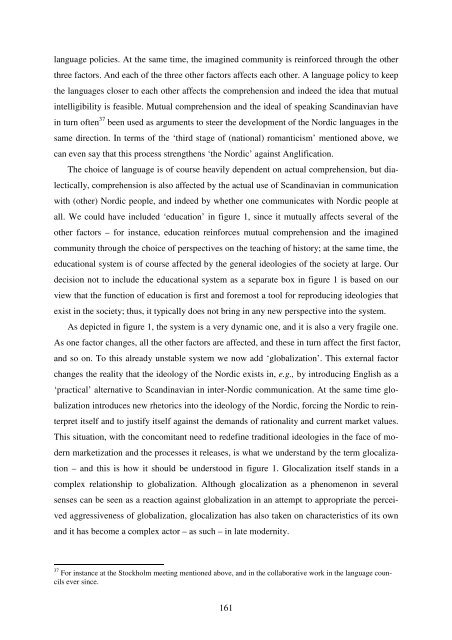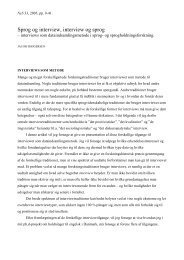Hør dog hvad de siger - Note-to-Self: Trials & Errors
Hør dog hvad de siger - Note-to-Self: Trials & Errors
Hør dog hvad de siger - Note-to-Self: Trials & Errors
You also want an ePaper? Increase the reach of your titles
YUMPU automatically turns print PDFs into web optimized ePapers that Google loves.
language policies. At the same time, the imagined community is reinforced through the other<br />
three fac<strong>to</strong>rs. And each of the three other fac<strong>to</strong>rs affects each other. A language policy <strong>to</strong> keep<br />
the languages closer <strong>to</strong> each other affects the comprehension and in<strong>de</strong>ed the i<strong>de</strong>a that mutual<br />
intelligibility is feasible. Mutual comprehension and the i<strong>de</strong>al of speaking Scandinavian have<br />
in turn often 37 been used as arguments <strong>to</strong> steer the <strong>de</strong>velopment of the Nordic languages in the<br />
same direction. In terms of the ‘third stage of (national) romanticism’ mentioned above, we<br />
can even say that this process strengthens ‘the Nordic’ against Anglification.<br />
The choice of language is of course heavily <strong>de</strong>pen<strong>de</strong>nt on actual comprehension, but dia-<br />
lectically, comprehension is also affected by the actual use of Scandinavian in communication<br />
with (other) Nordic people, and in<strong>de</strong>ed by whether one communicates with Nordic people at<br />
all. We could have inclu<strong>de</strong>d ‘education’ in figure 1, since it mutually affects several of the<br />
other fac<strong>to</strong>rs – for instance, education reinforces mutual comprehension and the imagined<br />
community through the choice of perspectives on the teaching of his<strong>to</strong>ry; at the same time, the<br />
educational system is of course affected by the general i<strong>de</strong>ologies of the society at large. Our<br />
<strong>de</strong>cision not <strong>to</strong> inclu<strong>de</strong> the educational system as a separate box in figure 1 is based on our<br />
view that the function of education is first and foremost a <strong>to</strong>ol for reproducing i<strong>de</strong>ologies that<br />
exist in the society; thus, it typically does not bring in any new perspective in<strong>to</strong> the system.<br />
As <strong>de</strong>picted in figure 1, the system is a very dynamic one, and it is also a very fragile one.<br />
As one fac<strong>to</strong>r changes, all the other fac<strong>to</strong>rs are affected, and these in turn affect the first fac<strong>to</strong>r,<br />
and so on. To this already unstable system we now add ‘globalization’. This external fac<strong>to</strong>r<br />
changes the reality that the i<strong>de</strong>ology of the Nordic exists in, e.g., by introducing English as a<br />
‘practical’ alternative <strong>to</strong> Scandinavian in inter-Nordic communication. At the same time glo-<br />
balization introduces new rhe<strong>to</strong>rics in<strong>to</strong> the i<strong>de</strong>ology of the Nordic, forcing the Nordic <strong>to</strong> rein-<br />
terpret itself and <strong>to</strong> justify itself against the <strong>de</strong>mands of rationality and current market values.<br />
This situation, with the concomitant need <strong>to</strong> re<strong>de</strong>fine traditional i<strong>de</strong>ologies in the face of mo-<br />
<strong>de</strong>rn marketization and the processes it releases, is what we un<strong>de</strong>rstand by the term glocaliza-<br />
tion – and this is how it should be un<strong>de</strong>rs<strong>to</strong>od in figure 1. Glocalization itself stands in a<br />
complex relationship <strong>to</strong> globalization. Although glocalization as a phenomenon in several<br />
senses can be seen as a reaction against globalization in an attempt <strong>to</strong> appropriate the percei-<br />
ved aggressiveness of globalization, glocalization has also taken on characteristics of its own<br />
and it has become a complex ac<strong>to</strong>r – as such – in late mo<strong>de</strong>rnity.<br />
37 For instance at the S<strong>to</strong>ckholm meeting mentioned above, and in the collaborative work in the language coun-<br />
cils ever since.<br />
161



